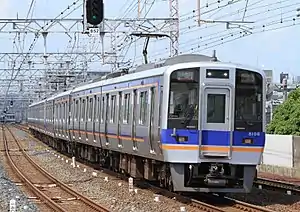| Nankai 8000 series | |
|---|---|
 Set 8008 in July 2017 | |
| In service | 2008– |
| Manufacturer | Tokyu Car, J-TREC |
| Built at | Yokohama |
| Replaced | 7000 series |
| Constructed | 2007– |
| Number built | 52 vehicles (13 sets) |
| Number in service | 52 vehicles (13 sets) |
| Formation | 4 cars per trainset |
| Fleet numbers | 8001– |
| Operators | Nankai Electric Railway |
| Lines served | Nankai Main Line, Nankai Wakayamakō Line, Nankai Airport Line |
| Specifications | |
| Car body construction | Stainless steel |
| Car length | 20,800 mm (68 ft 3 in) (end cars) 20,700 mm (67 ft 11 in) (intermediate cars) |
| Width | 2,820 mm (9 ft 3 in) |
| Height | 4,140 mm (13 ft 7 in) (end cars) 4,050 mm (13 ft 3 in) (intermediate cars) |
| Floor height | 1,150 mm (3 ft 9 in) |
| Doors | 4 pairs per side |
| Maximum speed | 110 km/h (68.4 mph) |
| Traction system | MB-5091-A2 (180 kW) x4 per motor car (Variable-frequency) |
| Power output | 1,440 kW per 4-car set |
| Acceleration | 2.5 km/(h⋅s) (1.6 mph/s) |
| Deceleration | 3.7 km/(h⋅s) (2.3 mph/s) (service) 4.0 km/(h⋅s) (2.5 mph/s) (emergency) |
| Electric system(s) | 1,500 V DC |
| Current collector(s) | Overhead wire |
| Bogies | SS177M (motored) SS177T (trailer) |
| Multiple working | 12000 series |
| Track gauge | 1,067 mm (3 ft 6 in) |
The Nankai 8000 series (南海8000系) is an electric multiple unit (EMU) train type operated by the private railway operator Nankai Electric Railway in Japan since 2008.[1]
Design
The 8000 series design was developed from the earlier 1000 series EMUs first introduced in 1992.[1]
Operations
The 8000 series is used on Nankai Line commuter services singly or coupled with 12000 series EMUs on Southern Premium limited express services to provide non-reserved accommodation.[1]
Formation
As of 1 April 2016, the fleet consisted of thirteen four-car sets formed as follows with two motored (M) cars and two trailer (T) cars.[2][3]
| Designation | Mc1 | T1 | T2 | Mc2 |
|---|---|---|---|---|
| Numbering | 8000 | 8800 | 8850 | 8100 |
| Weight (t) | 37.5 | 26.0 | 27.5 | 36.0 |
| Capacity (total/seated) | 142/47 | 152/55 | 142/47 | |
The two end cars are each fitted with one PT7144-B single-arm pantograph.[3]
Interior
Passenger accommodation consists of longitudinal seating throughout, with a seat width of 460 mm (18 in) per person.[3]
 The interior of an 8000 series trainset in September 2011
The interior of an 8000 series trainset in September 2011
History
The first sets entered service in 2008.[1]
Fleet history
The fleet history details are as shown below (data not available prior to 2013).[2]
| Set No. | Manufacturer | Date delivered |
|---|---|---|
| 8001 | Tokyu Car Corporation | 2007 |
| 8002 | ||
| 8003 | 2009 | |
| 8004 | ||
| 8005 | 2010 | |
| 8006 | March 2012 | |
| 8007 | ||
| 8008 | J-TREC (Yokohama) | 9 March 2013 |
| 8009 | ||
| 8010 | 11 April 2014 | |
| 8011 | 14 April 2014 | |
| 8012 | 19 May 2014 | |
| 8013 | 20 May 2014 |
References
- 1 2 3 4 私鉄車両年鑑 2013: 大手15社営業用車両完全網羅 私鉄車両年鑑2013 [Japan Private Railways Annual 2013]. Tokyo, Japan: Ikaros Publications Ltd. 20 March 2013. p. 120. ISBN 978-4-86320-693-9.
- 1 2 私鉄車両編成表 2016 [Private Railway Rolling Stock Formations – 2016] (in Japanese). Japan: Kotsu Shimbunsha. 25 July 2016. p. 149. ISBN 978-4-330-70116-5.
- 1 2 3 Fukuhara, Eiji (April 2008). 南海電気鉄道8000系 [Nankai 8000 series]. Japan Railfan Magazine (in Japanese). Vol. 48, no. 564. Japan: Koyusha Co., Ltd. pp. 62–66.
External links
- Nankai Electric Railway 8000 series (Japan Railfan Magazine) (in Japanese)